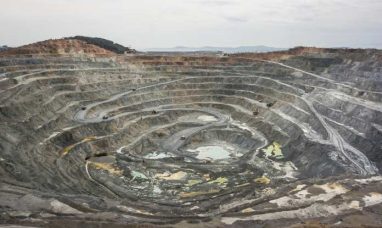VANCOUVER, British Columbia, July 09, 2024 – West Red Lake Gold Mines Ltd. (“West Red Lake Gold” or “WRLG” or the “Company”) (TSXV:WRLG) (OTCQB:WRLGF) is pleased to report drill results from its 100% owned Madsen Mine located in the Red Lake Gold District of Northwestern Ontario, Canada.
This round of drill results from the Madsen Mine were all drilled from underground on the North Austin Zone, which represents a new area of high-grade mineralization extending the current Madsen resource to the northeast. This program was designed to expand the North Austin zone down-plunge and to the northeast.
The North Austin drilling update provided in this news release builds on the positive drill results previously announced on May 21, 2024 and Feb 7, 2024.
The North Austin Zone sits adjacent to existing underground development marking it as a high caliber, near-surface target that could potentially be developed early during future mine restart and production. The North Austin Zone remains open down-plunge and along strike to the northeast and will continue to be a priority expansion target as underground drilling continues.
HIGHLIGHTS:
- Hole MM24X-03-5195-018 Intersected 10m @ 13.40 grams per tonne gold (“g/t Au”), from 82m to 92m, Including 1.0m @ 17.75 g/t Au, from 82m to 83m, also Including 1.0m @ 85.61 g/t Au, from 88.31m to 89.31m, also Including 1.0m @ 14.05 g/t Au, from 89.31m to 90.31m.
- Hole MM24X-03-5127-012 Intersected 3m @ 12.21 g/t Au, from 58m to 61m, Including 1m @ 32.84 g/t Au, from 60m to 61m.
- Hole MM24X-03-5195-015 Intersected 16.98m @ 3.12 g/t Au, from 82m to 92m, Including 0.98m @ 11.78 g/t Au, from 72.52m to 73.50m, also Including 1.0m @ 14.69 g/t Au, from 74.45m to 75.45m, also Including 0.79m @ 15.60 g/t Au, from 87.21m to 88.00m.
Shane Williams, President & CEO, stated, “The North Austin drilling continues to deliver meaningful results which is a testament not only to the quality of this resource area, but also to our technical team’s understanding of the structural controls and ore shoot geometries in this emerging part of the Madsen deposit. With the team now working towards a planned mine restart in the second half of 2025, the drills at Madsen will continue to delineate and define the high-value mineral inventory needed to support that objective.”
Plan maps and section for the South Austin drilling outlined in this release are provided in Figures 2 through 7.
TABLE 1. Significant intercepts (>3 g/t Au) from drilling at North Austin Zone.
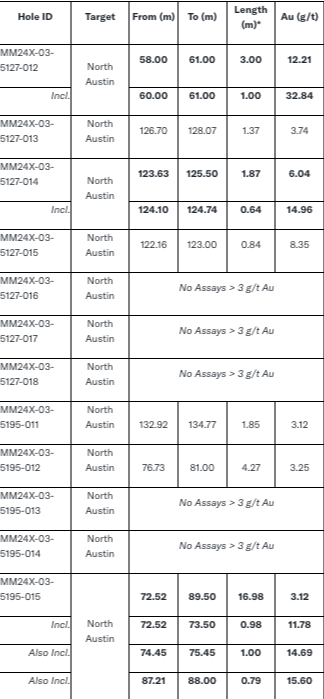
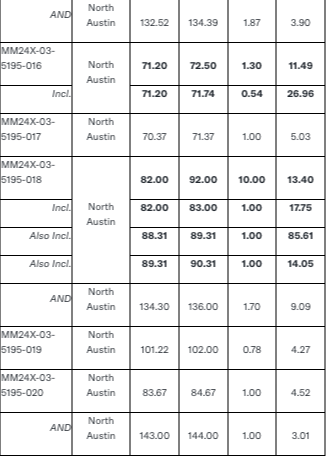
*The “From-To” intervals in Table 1 are denoting overall downhole length of the intercept. True thickness has not been calculated for these intercepts but is expected to be ≥ 70% of downhole thickness based on intercept angles observed in the drill core.
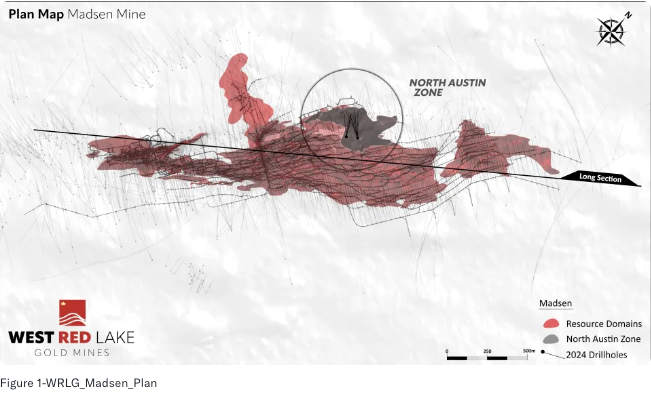
FIGURE 1. Deposit-scale plan map of Madsen Mine highlighting North Austin Zone and drill traces included in this news release.
TABLE 2: Drill collar summary for holes reported in this News Release.
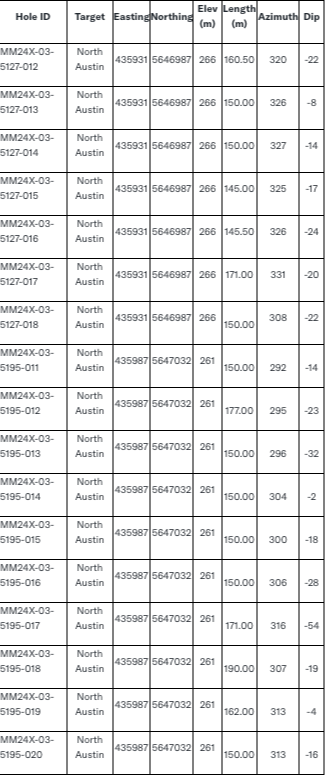
DISCUSSION
Accessed through the Madsen Mine East Portal, the North Austin Zone sits northeast in the footwall of the main Austin Zone. Like the main Austin and South Austin Structures, the North Austin domain is hosted within broad, kilometer-scale planar alteration and deformation corridors that have been repeatedly reactivated during gold mineralization and subsequent deformation and metamorphism.
At the deposit-scale the Austin, South Austin, North Austin, and McVeigh Zones are locally folded and structurally dismembered by transposition and rotation into the penetrative S2 Foliation. In addition to this intense deformation overprint, the mineralized veins and alteration have been subjected to the relatively high temperatures of amphibolite facies metamorphism, which led to extensive recrystallization and growth of the skarn-like replacement mineral assemblage of diopside-amphibole-quartz-biotite.
All significant gold mineralization on the mine property is demonstrably early relative to the most significant, penetrative deformation (D2) and metamorphic events. The North Austin Zone displays ‘mine-style’ alteration and mineralization and consists of multiple mineralized domains defined over a strike length of 0.5km. Mineralization remains open at depth and along strike to the northeast.
In drill core, or at underground face exposures, gold-bearing zones at the Madsen Mine are best identified visually by fine (sub-millimetre) grains of free gold within strong alteration and veining. All high-grade intervals generally contain visible gold on drill core exteriors, although numerous examples exist of high-grade assays where visible gold was only identified within the interior (cut surface) of the core samples. Apart from the presence of free gold, pervasive silicification (locally accompanied by discrete quartz veining) and quartz-carbonate or diopside veining are the best indicators that a given interval is within a high-grade zone along/within the mineralized structure.
The current underground drilling program at the Madsen Mine is focused on further definition of near-term mining inventory, as well as growth of the current mineral resource. Drilling has been focused on the more continuous and higher-grade portions of the Austin, South Austin, and North Austin Zones. This will continue to be the strategy moving into 2025.
High resolution versions of all the figures contained in this press release can be found at the following web address: https://westredlakegold.com/july-release-maps/
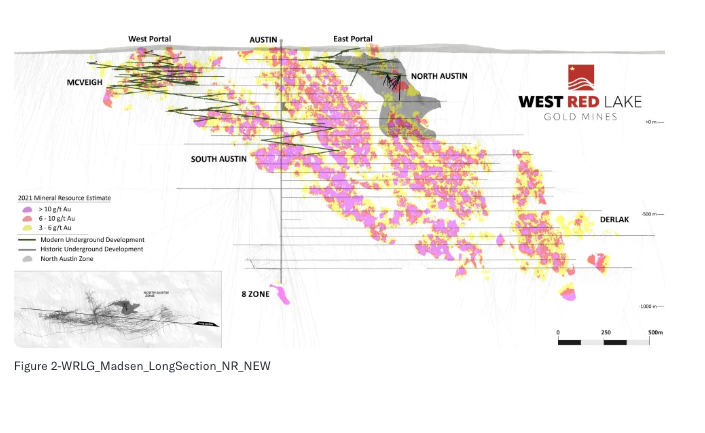
FIGURE 2. Madsen Mine long section showing location of 03-5127 and 03-5195 Drill Bays in North Austin Zone.[1]
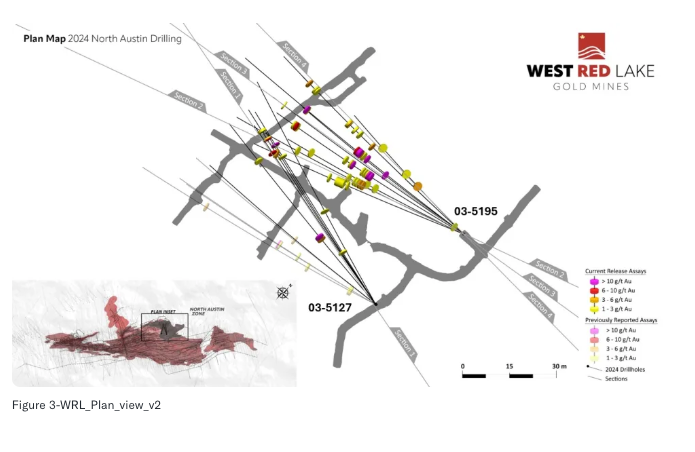
FIGURE 3. North Austin plan view showing distribution of drilling and reference lines for drill sections in Figures 4 through 7.
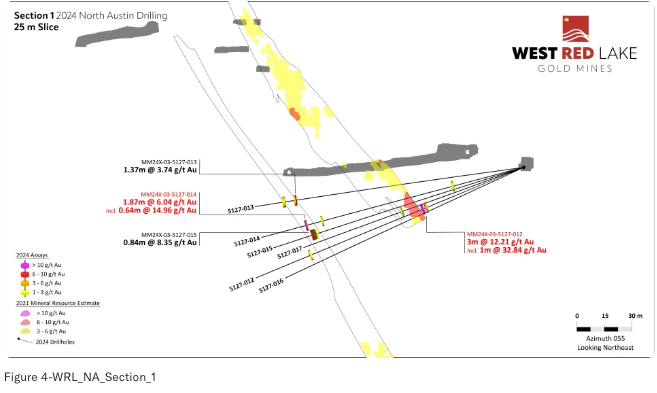
FIGURE 4. North Austin section view showing assay highlights for Holes MM24X-03-5127-012 through -017.[1]
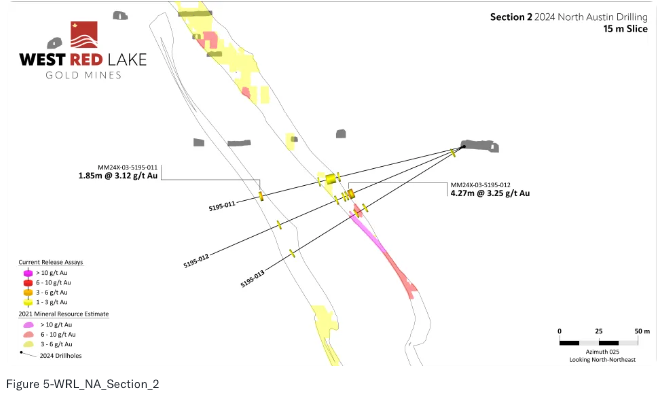
FIGURE 5. North Austin section view showing assay highlights for Holes MM24X-03-5195-011 through -013.[1]
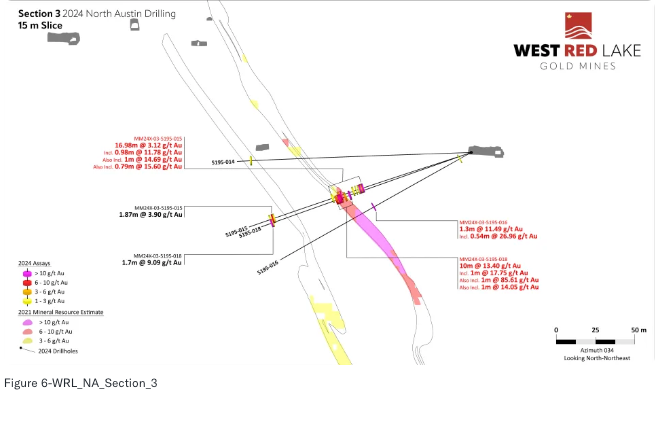
FIGURE 6. North Austin section view showing assay highlights for Holes MM24X-03-5195-014 through -016 and -018.[1]
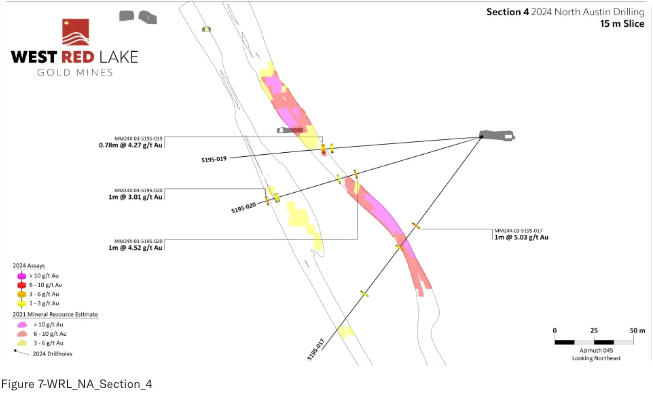
FIGURE 7. North Austin section view showing assay highlights for Holes MM24X-03-5195-017, -019 and -020.[1]
QUALITY ASSURANCE/QUALITY CONTROL
Drilling completed underground at the Madsen Mine consists of BQ-sized diamond drill core for definition drill programs and oriented NQ-sized diamond drill core for exploration focused drilling. All drill holes are systematically logged, photographed, and sampled by a trained geologist at the Madsen Mine core processing facility. Minimum allowable sample length is 0.5m. Maximum allowable sample length is 1.5m. Control samples (certified standards and uncertified blanks), along duplicates, are inserted at a target 5% insertion rate. Results are assessed for accuracy, precision, and contamination on an ongoing basis. The BQ-sized drill core is whole core sampled. The NQ-sized drill core is then cut lengthwise utilizing a diamond blade core saw along a line pre-selected by the geologist. To reduce sampling bias, the same side of drill core is sampled consistently utilizing the orientation line as reference. For those samples containing visible gold (“VG”), a trained geologist supervises the cutting/bagging of those samples, and ensures the core saw blade is ‘cleaned’ with a dressing stone following the VG sample interval. Bagged samples are then sealed with zip ties and transported by Madsen Mine personnel directly to SGS Natural Resource’s Facility in Red Lake, Ontario for assay.
Samples are then prepped by SGS, which consists of drying at 105°C and crushing to 75% passing 2mm. A riffle splitter is then utilized to produce a 500g course reject for archive. The remainder of the sample is then pulverized to 85% passing 75 microns from which 50g is analyzed by fire assay and an atomic absorption spectroscopy (AAS) finish (SGS Code GO-FAA50V10). Samples returning gold values > 100 g/t Au are reanalyzed by fire assay with a gravimetric finish on a 50g sample (SGS Code GO_FAG50V). Samples with visible gold are also analyzed via metallic screen analysis (SGS code: GO_FAS50M). For multi-element analysis, samples are sent to SGS’s facility in Burnaby, British Columbia and analyzed via four-acid digest with an atomic emission spectroscopy (ICP-AES) finish for 33-element analysis on 0.25g sample pulps (SGS code: GE_ICP40Q12). SGS Natural Resources analytical laboratories operates under a Quality Management System that complies with ISO/IEC 17025.
The Madsen Mine deposit presently hosts a National Instrument 43-101 – Standards of Disclosure for Mineral Projects (“NI 43-101”) Indicated resource of 1.65 million ounces (“Moz”) of gold grading 7.4 g/t Au and an Inferred resource of 0.37 Moz of gold grading 6.3 g/t Au. Mineral resources are estimated at a cut-off grade of 3.38 g/t Au and a gold price of US1,800/oz. Mineral resources that are not mineral reserves do not have demonstrated economic viability. Please refer to the technical report entitled “Independent NI 43-101 Technical Report and Updated Mineral Resource Estimate for the PureGold Mine, Canada”, prepared by SRK Consulting (Canada) Inc. and dated June 16, 2023, and amended April 24, 2024 (the “Madsen Report”). The Madsen Resource Estimate has an effective date of December 31, 2021 and excludes depletion of mining activity during the period from January 1, 2022 to the mine closure on October 24, 2022 as it has been deemed immaterial and not relevant for the purpose of the Madsen Report. A full copy of the Madsen Report is available on the Company’s website and on SEDAR+ at www.sedarplus.ca.
The technical information presented in this news release has been reviewed and approved by Will Robinson, P.Geo., Vice President of Exploration for West Red Lake Gold and the Qualified Person for exploration at the West Red Lake Project, as defined by NI 43-101 “Standards of Disclosure for Mineral Projects”.
ABOUT WEST RED LAKE GOLD MINES
West Red Lake Gold Mines Ltd. is a mineral exploration company that is publicly traded and focused on advancing and developing its flagship Madsen Gold Mine and the associated 47 km2 highly prospective land package in the Red Lake district of Ontario. The highly productive Red Lake Gold District of Northwest Ontario, Canada has yielded over 30 million ounces of gold from high-grade zones and hosts some of the world’s richest gold deposits. WRLG also holds the wholly owned Rowan Property in Red Lake, with an expansive property position covering 31 km2 including three past producing gold mines – Rowan, Mount Jamie, and Red Summit.
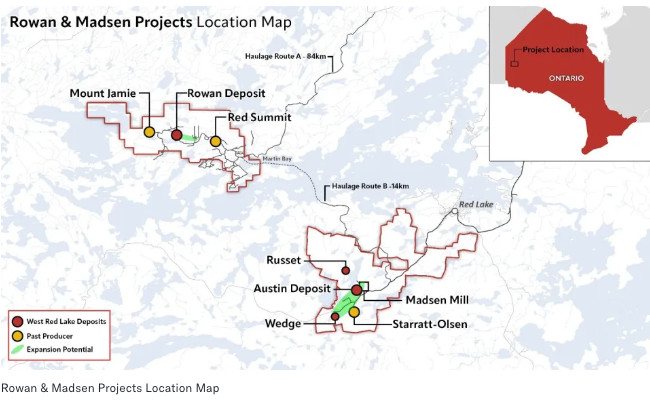
ON BEHALF OF WEST RED LAKE GOLD MINES LTD.
“Shane Williams”
Shane Williams
President & Chief Executive Officer
FOR FURTHER INFORMATION, PLEASE CONTACT:
Freddie Leigh
Tel: (604) 609-6132
Email: [email protected] or visit the Company’s website at https://www.westredlakegold.com
Neither the TSX Venture Exchange nor its Regulation Services Provider (as that term is defined in the policies of the TSX Venture Exchange) accepts responsibility for the adequacy or accuracy of this release.
FORWARD-LOOKING INFORMATION
Certain statements contained in this news release may constitute “forward-looking information” within the meaning of applicable securities laws. Forward-looking information generally can be identified by words such as “anticipate”, “expect”, “estimate”, “forecast”, “planned”, and similar expressions suggesting future outcomes or events. Forward-looking information is based on current expectations of management; however, it is subject to known and unknown risks, uncertainties and other factors that may cause actual results to differ materially from the forward-looking information in this news release and include without limitation, statements relating to plans for the restart of mining operations at the Madsen Mine, the potential of the Madsen Mine; any untapped growth potential in the Madsen deposit and the Company’s future objectives and plans. Readers are cautioned not to place undue reliance on forward-looking information.
Forward-looking information involve numerous risks and uncertainties and actual results might differ materially from results suggested in any forward-looking information. These risks and uncertainties include, among other things, market volatility; the state of the financial markets for the Company’s securities; fluctuations in commodity prices; timing and results of the cleanup and recovery at the Madsen Mine; and changes in the Company’s business plans. Forward-looking information is based on a number of key expectations and assumptions, including without limitation, that the Company will continue with its stated business objectives and its ability to raise additional capital to proceed. Although management of the Company has attempted to identify important factors that could cause actual results to differ materially from those contained in forward-looking information, there may be other factors that cause results not to be as anticipated, estimated or intended. There can be no assurance that such forward-looking information will prove to be accurate, as actual results and future events could differ materially from those anticipated in such forward-looking information. Accordingly, readers should not place undue reliance on forward-looking information. Readers are cautioned that reliance on such information may not be appropriate for other purposes. Additional information about risks and uncertainties is contained in the Company’s management’s discussion and analysis for the year ended November 30, 2023, and the Company’s annual information form for the year ended November 30, 2023, copies of which are available on SEDAR+ at www.sedarplus.ca.
The forward-looking information contained herein is expressly qualified in its entirety by this cautionary statement. Forward-looking information reflects management’s current beliefs and is based on information currently available to the Company. The forward-looking information is made as of the date of this news release and the Company assumes no obligation to update or revise such information to reflect new events or circumstances, except as may be required by applicable law.
For more information on the Company, investors should review the Company’s continuous disclosure filings that are available on SEDAR+ at www.sedarplus.ca.
[1] Mineral resources are estimated at a cut-off grade of 3.38 g/t Au and a gold price of US1,800/oz. Please refer to the technical report entitled “Independent NI 43-101 Technical Report and Updated Mineral Resource Estimate for the PureGold Mine, Canada”, prepared by SRK Consulting (Canada) Inc. and dated June 16, 2023, and amended April 24, 2024. A full copy of the SRK report is available on the Company’s website and on SEDAR+ at www.sedarplus.ca.
Featured Image @ Freepik














